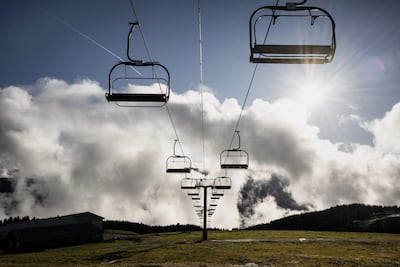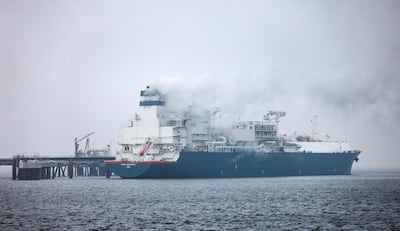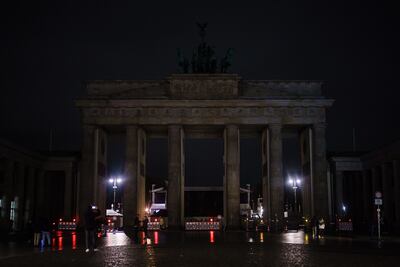As winter drew breath, Europe was looking ruefully at its empty Russian gas stocks and bracing for cold, dark days ahead.
Prices were surging, plans for power cuts were being drawn up, and there was much doubt whether Europe could hold its united front against Moscow.
But as spring arrives, Europe — if not exactly in jubilant mood — has clearly averted a worst-case meltdown.
Emergency plans were left on the shelf. Gas prices are down and many storage tanks are still more than half full — despite Russia withholding 34 billion cubic metres of gas.
Figures published on Wednesday showed wind and solar power meeting a record share of EU demand last year, boosting the push to replace gas with renewables.
Forecasters said this week that the hit to Germany’s economy, Europe’s biggest, was “less severe than feared” and predicted modest growth this year.
“At worst we should now see only mild downturns and we may yet see recessions avoided altogether” in the UK and EU, said Stuart Cole, chief macro economist at Equiti Capital.
The high prices have squeezed households and businesses. Strikes have affected much of Europe and about 350 leisure centres in Britain were forced to close or reduce services during winter, according to industry group UK Active.
Nonetheless, senior European officials have been boasting for weeks now that “Russia’s energy blackmail has failed”.
So how did Europe make its gas last the winter?
Mild weather
A mild winter was a stroke of luck — sort of.
Europe had its joint second-warmest winter on record, according to the Copernicus monitoring satellites.
New Year’s Day brought an unprecedented 20°C to the Swiss Alps, while Poland greeted 2023 with a “one-day thermal summer”.
In Germany, temperatures remained above average in five of the past six months.
All of this undoubtedly made it easier for households to keep their thermostats down.
The bad news is that the mild winter is regarded by scientists as an omen of climate change.
Regular heatwaves might save energy in winter but they have the opposite effect in summer when people crank up their air conditioning.

More supply
In a report to EU member states last month, energy regulators said about 42 per cent of the lost Russian gas was replaced by imports from elsewhere.
Norway has positioned itself as the top oil and gas exporter to Europe.
Large volumes of liquefied natural gas were imported from the US, after Germany built its first LNG terminal in less than 200 days.
The EU's LNG imports rose to 135 billion cubic metres from 80 billion a year earlier — with imports rising from Russia even as pipeline gas was cut off.
Lower LNG demand from China, because of continued Covid-19 restrictions, eased pressure on the market.
If China rebounds in the second half of 2023, this could push up prices and limit available cargoes for next winter, the regulators warned.
Wind and solar meanwhile contributed 22 per cent of Europe's electricity last year, according to energy think tank Ember, up from 19 per cent in 2021. They provided almost a third in Germany, Spain and the Netherlands.
Germany also extended the life of condemned coal and nuclear plants, with its last three atomic reactors due to be switched off this weekend.

Less demand
Europeans dimmed the lights of everything from shop fronts to the Brandenburg Gate as countries sought to save energy.
Households were bombarded with advice on turning down boiler temperatures and taking shorter showers.
EU figures suggest the campaign worked, no doubt helped by the mild weather.
The bloc’s gas consumption from August to January was down 19.3 per cent on the average of the previous five years. The biggest savings were in Finland (57.3 per cent), Lithuania (47.9 per cent) and Sweden (40.2 per cent).
This helped Europe to store up its gas for longer.
Germany’s gas tanks remained almost completely full deep into November. As of April 1 they were still 64 per cent filled — compared to 27 per cent a year earlier.
“Germany's energy supplies were secure in a difficult winter and will continue to be secure,” Vice Chancellor and Economy Minister Robert Habeck said this week.
“We have the situation in hand due to high levels of gas storage and the new liquid gas terminals on the north German coast, not to mention more renewable energy.”

Market confidence
High prices were driven by doubts over whether Europe could live without Russian gas.
Once new gas deals were signed and it became clear the situation might not be as dire as feared, markets relaxed and prices started to fall.
“I think the markets were surprised about just how quickly these agreements were reached, including the ability of these alternative producers to find the capacity to export to the UK and EU,” said Mr Cole.
“While the price of gas is less than what it was, it is still relatively expensive, but no longer prohibitively so. And I believe that supplies to the UK and EU are not yet at the levels they were, but are sufficient that the market is no longer pricing in the risk of outright shortages.”
The mood of business has also bounced back, with German car manufacturers this month declaring themselves satisfied with their order books.
The drop in energy prices means purchasing power in Germany has not taken as much of a hit as feared, said Timo Wollmershaeuser of the IFO research institute.
“The economic setback in the winter half-year 2022/2023 is likely to have been less severe than feared in the autumn,” he said.


